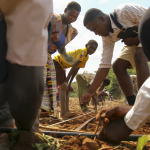An article in World Development reflects on two decades of research by IFPRI economists and nutritionists and concludes that well-designed pragmatic randomized controlled trials (RCTs) can generate evidence that helps partners design and implement successful multi-sectoral development programs at scale. The article is part of the journal’s inaugural Symposium on Development and Poverty Alleviation marking […]
Featured Resources: Week of February 10
The second episode of Research Talks—a monthly podcast from IFPRI—explores how the Agriculture, Nutrition, and Gender Linkages (ANGeL) project used trainings to directly empower poor people in Bangladesh. The government of Bangladesh is now implementing ANGeL nationwide. Additional highlights from this week’s Compact2025 News in Brief include: Three experts give their viewpoint drawn from the […]
“Let us work together for development”—Compact2025 technical support to new food security initiative in Malawi
Despite progress, Malawi faces development challenges of poverty, food insecurity, and malnutrition. To address these issues, the Government of Malawi developed a National Resilience Strategy (NRS) to guide investments in agriculture, promote household resilience, strengthen management of Malawi’s natural resources, and work closely together with stakeholders. CARE and partners, including IFPRI’s Compact2025 initiative and funding […]
Featured Resources: Week of November 25
Outgoing IFPRI Director General Shenggen Fan reflects in a Global Food Policy article on the promise of food policy to change human lives. He shares experiences from his time at IFPRI and lessons learned about how to best exploit the promise of food policy to eradicate hunger and ensure food and nutrition security for all […]
Featured Resources: Week of June 10
An evaluation of a nutrition- and gender-sensitive agriculture program in Burkina Faso found that improvements in women's empowerment in the domains of spousal communication, purchasing decisions, healthcare decisions, and family planning decisions contributed to the program's impact on reducing child wasting. These findings provide the first evidence from a randomized controlled trial that women's empowerment […]





